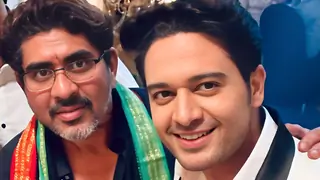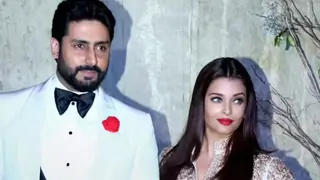Profession: Playback Singer, Bollywood.
Kishore Kumar's was the second golden male voice that the film industry produced. , the first being that of Kundan Lal Sehgal. Besides being a singer, Kishore was a talented actor and comedian who stood out for his performances. He made his mark as an accomplished film and music director.
The traditional concept of a comedian has always been one of lowly stature, that of a sidekick. It was Kishore Kumar who successfully became Hindi cinema's comic hero whose popularity relied primarily on his comic talents. Add to that his phenomenal acting talent and amazing singing voice and you have a performer who bordered on the genius. And like most geniuses he was notoriously eccentric!
He was born as Abhas Kumar Ganguly in Khandwa. As a child, he had been mischievous and loved playing pranks on everyone around him. His penchant for effortless comedy perhaps, came from his early days of pranks and mimicry. And there were directors like Kalidas (Half Ticket) and Satyen Bose (Chalti Ka Naam Gaadi) and actor-director Keshto Mukherjee (co-star in Padosan) who realised this potential and cashed in on his unusual brand of humour with stupendous success.
At the age of 18, he came to Bombay where elder brother Ashok Kumar was a major star. He got his first opportunity as a singer in Bombay Talkies Ziddi (1948) where he sang the song Marne ki Duayen Kyon Mangu for Dev Anand. Being an ardent admirer of K.L. Saigal, the song was sung in the style of the legend. But in spite of Ziddi's success, Kishore found few offers forthcoming and did the odd singing assignment with bit roles making a rather tepid acting debut as hero in the forgettable Andolen (1951). At the age of 18, he came to Bombay where elder brother Ashok Kumar was a major star. He got his first opportunity as a singer in Bombay Talkies Ziddi (1948) where he sang the song Marne ki Duayen Kyon Mangu for Dev Anand. Being an ardent admirer of K.L. Saigal, the song was sung in the style of the legend. But in spite of Ziddi's success, Kishore found few offers forthcoming and did the odd singing assignment with bit roles making a rather tepid acting debut as hero in the forgettable Andolen (1951). After his marriage to Ruma Devi resulted in a split in the family, Kishore approached S.D. Burman who had given him an opportunity in Pyar (1950) where interestingly he had sung for Raj Kapoor. Burmanda gave him the song Qusoor Aapka in Bahar (1951) which became a hit. As he got more singing assignments, he also began being offered leading roles in films. Kishore was initially taken quite lightly as a singer and was given mainly lighter songs by Burmanda and other music directors. But with the soulful Dukhi Man Mere from Funtoosh (1956), Kishore was now taken seriously as a singer. Though he was formally untrained, he assimilated jazz-scat fragmented musical notes into a rhythmic sequence and once its beat was established, departed from the pattern and combined notes and words/ syllables into new kinds of musical harmony.
Kishore reached his peak as an actor with the zany comedy Chalti Ka Naam Gaadi (1958) which starred all the three Ganguly brothers and Madhubala. Kishore and Madhubala matched each other step for step in this comic caper with Burmanda composing such lighthearted ditties as Haal Kaisa Hai Janaab Ka and Paanch Rupaiya Barah Anna. After Kishore's marriage to Ruma Devi disintegrated, he married Madhubala. The two starred in Jhumroo (1961), which Kishore produced and directed. He also composed the music of the film. The riotous Half Ticket (1962) with the two of them saw Kishore at his madcap best impersonating a 12 year old!
For all his eccentricity, Kishore married some of the most beautiful women in India. First Ruma Guha-Thakurta (the mother of his singer son Amit Kumar), then the beautiful Madhubala (whom he literally nursed for years till her death), Yogita Bali (niece of the great Geeta Bali) and finally Leena Chandavarkar. There are any number of Kishore Kumar tales to be heard in Mumbai. The best is how when he was shooting for a Satyen Bose film in Mahableshwar, he was supposed to come out of a bungalow, get into a car and go past the gate. After a couple of retakes, Kishore got into the car and drove past straight to Bombay while the entire unit waited for him to return. Night fell, but there was no sign of the man. To make matters worse, the car belonged to the producer. He was a miser, screamed that the taxmen took away all his earnings. And considerable earnings they were too: he charged Rs 15,000 per song. He charged one rupee less than Lata Mangeshkar to show his respect for her and her seniority. And he talked of going back to Khandwa to become a farmer.
He shunned people, never smoke or drank and had no friends. Once when a lady gossip writer asked him who his friends were, he took her to his backyard and introduced her to half-a-dozen trees. There they are, he said, Janardhan, Raghunandan, Gangadhar, Jagannath, Budhuram and Jhatpatjhatpat-jhatpat! The lady wrote that he was mad.
Door Gagan ki Chaon Main (1964) further confirmed Kishore's acting talent as he scored heavily in a rather serious film. But the 60s also saw Kishore fall from grace as beset by tax problems he was reduced to doing B-films with the likes of Kum Kum. He had the odd singing assignment for Dev Anand in Guide (1965) and Jewel Thief (1967) but that was all. The turning point came with Aradhana (1969).Though Burmanda used Kishore as what he called his second service, his songs for Rajesh Khanna - Mere Sapnon ki Rani and Kora Kagaz Tha Yeh Man Mera proved super duper hits ahead of theMohd. Rafisongs for the same film. It was a second coming and there was no turning back. Kishore formed a solid hit pairing with Rajesh Khanna and in the early 70s the duo churned out hit after hit. He overtook all competition and was the undisputed number one male playback singer of Hindi films, his voice pulsing with verve and exuberance.
As his fame grew so did stories of his eccentricities. He put up a board outside his house saying 'THIS IS A LUNATIC ASYLUM.' He reportedly spoke to his trees in his backyard addressing eachMby a special name. He zipped through a marriage with Yogita Bali which lasted just about a month and then married his fourth wife Leena Chandavarkar who was two years older than his son, Amit!
Kishore remained at the top till the very end succumbing to a major heart attack in 1987. The singer left for Mumbai when he was 18 years old but never failed to tell people that he hailed from Khandwa. But his wish to spend the twilight of his life here was never fulfilled. He succumbed to a heart attack in Mumbai on October 13, 1987. His body was subsequently brought to Khandwa. It was placed in the room where he was born.
| Awards And Honors : | |
| Award | Song - Movie |
| Filmfare Award - 1985 | Saagar kinare - Saagar |
| Filmfare Award - 1984 | Manzilen apni jageh - Sharabi |
| Filmfare Award - 1983 | Agar Tum Na Hote - Agar Tum Na Hote |
| Filmfare Award - 1982 | Pag Ghungroo - Namak Halal |
| Filmfare Award - 1980 | Hazar rahen - Thodisi Bewafayi |
| Filmfare Award - 1978 | Khaaike Paan Banaaras Wala - Don |
| Filmfare Award - 1975 | Dil ayesa kisi ne mera toda - Amanush |
| Filmfare Award - 1969 | Roop tera mastana - Aradhana |
| Best Of Kishore Kumar: | |
| Song | Movie |
| Nahin Nahin Abhi Nahin | Jawani Deewani |
| Aane wala pal jane wala hai | Gol Maal |
| Mere Saamne Waali Khidki Mein | Padosan |
| Chingari koi bhadke | Amar Prem |
| Raat Kali Ek Khwaab Mein Aayi | Budda Mil Gayaa |
| Dekha Ek Khwaab | Silsila |
| Aa Chal Ke Tujhe, Maein Leke Chalun | Door Gagan Ki Chaaon Mein |
| Humain tumse pyaar kitna | Kudrat |
| Yeh Jeevan Hai | Piya Ka Ghar |
| Tere Mere Milan Ki Ye Raina | Abhimaan |
| Zindagi Ka Safar Hai Ye Kaisa Safar | Safar |
| Tum aa gaye ho noor aa gaya hai | Aandhi |
| Sach Mere Yaar Hai, Bas Wohi Pyaar Hai | Saagar |
| Pal Pal Dil Ke Paas Tum Rehti Ho | Blackmail |





















